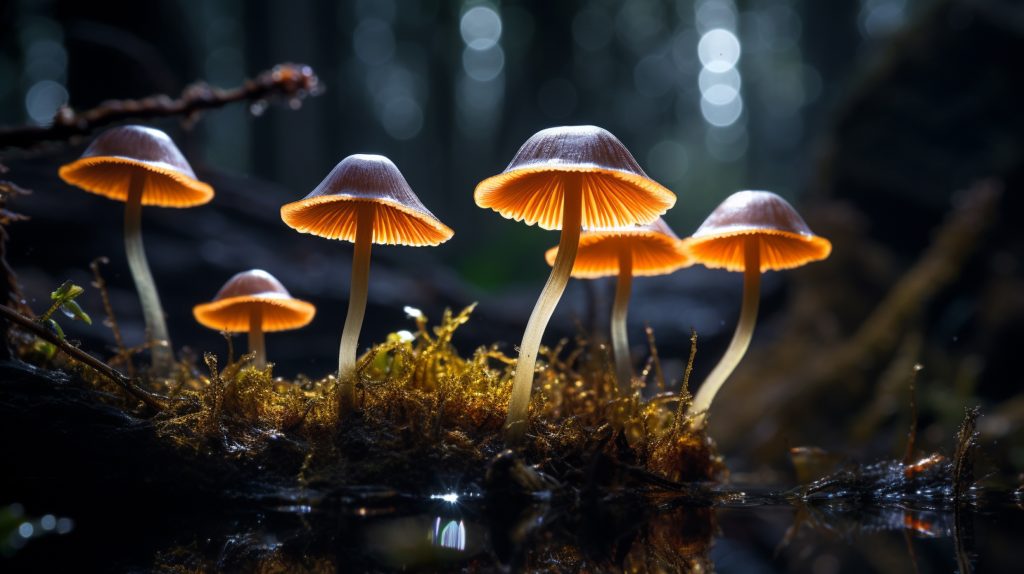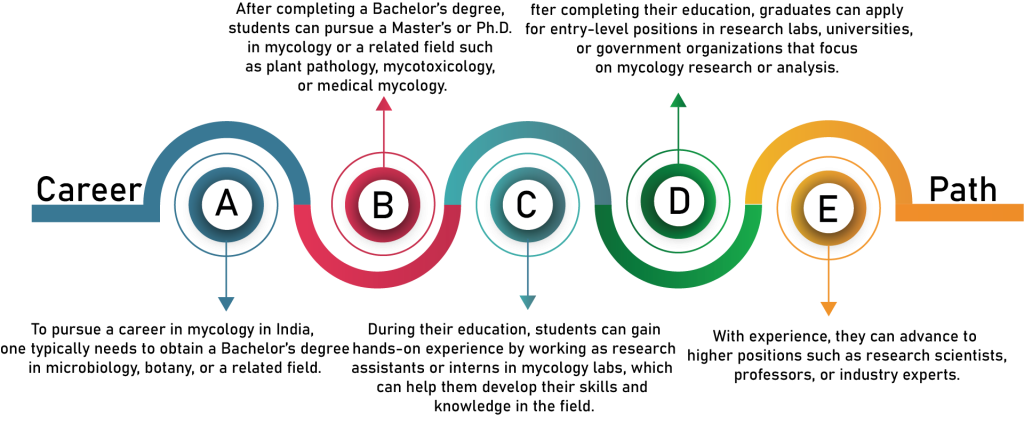Mycology is the scientific study of fungi, including their genetics, physiology, ecology, taxonomy, and potential uses. Fungi are a diverse group of organisms that play important roles in various ecosystems, including as decomposers, symbionts, and pathogens. Mycologists study the biology of fungi and their interactions with other organisms, as well as the practical applications of fungi in areas such as medicine, agriculture, and industry. This field is important for understanding and managing fungal diseases, as well as for developing new treatments and products derived from fungi.

Work description
A career in mycology involves studying and researching various aspects of fungi, such as their genetics, physiology, ecology, and taxonomy.
Mycologists may work in a variety of settings, including research laboratories, universities, government agencies, and private companies.
Their work may involve collecting and identifying different types of fungi, analyzing data to understand fungal biology, developing new techniques for controlling fungal diseases, and exploring the potential uses of fungi in areas such as medicine, agriculture, and biotechnology.
Some mycologists also teach and mentor students, share their research findings through publications and presentations, and collaborate with other scientists to advance knowledge in this field.
High Demand
Fascinating and diverse field of study.
Lucrative salaries
Opportunities to make important contributions to medicine, agriculture, and biotechnology.
Opportunities for innovation
Possibility of discovering new fungal species and developing new treatments for fungal diseases.
Versatility
Chance to work with a wide range of people, including other scientists, students, and industry professionals.
Flexibility
Potential for job stability and growth, as the demand for mycologists is expected to increase.
High stress
Can be highly specialized, which may limit job opportunities in some areas.
Long hours
Requires advanced education and training, which can be time-consuming and expensive.
Competitive field
May involve working long hours in a laboratory or field setting.
Constant learning
May require working with potentially hazardous organisms, which can be a safety concern.
Isolation
May face challenges in securing funding for research projects.
The amount of money needed to pursue a career in mycology in India can vary depending on several factors such as the level of education, institution, location, and personal expenses.
For example, pursuing a Bachelor’s degree in mycology from a government institution can cost around INR 50,000 to INR 1,00,000 per year, while studying at a private institution can cost upwards of INR 2,00,000 per year. Pursuing a Master’s degree or Ph.D. can also cost more, with fees ranging from INR 1,00,000 to INR 5,00,000 per year depending on the institution and program.
Other costs to consider include accommodation, food, transportation, books, and equipment, which can vary depending on the location and lifestyle. It’s important to research and budget accordingly before embarking on a career in mycology in India.
[wpcharts type=”horizontalbarchart” bgcolor=”red:gray:yellow,blue:gray:yellow,random:gray:yellow,purple:gray:yellow” min=”0″ legend=”true” titles=”2 year , 5 year” values=”3,7,5,12″]
The earning potential of someone with a career in mycology can vary depending on their level of education, experience, job role, and location.
Entry-level positions such as research assistants or laboratory technicians can earn an average salary of INR 2,50,000 to INR 4,00,000 per year in India. As they gain more experience and expertise, they can advance to higher positions such as research scientists, professors, or industry experts.
Research scientists in mycology can earn an average salary of INR 5,00,000 to INR 10,00,000 per year, while professors or lecturers in mycology can earn an average salary of INR 6,00,000 to INR 12,00,000 per year.
Working in the private sector or starting a business in mycology can also offer higher earning potential depending on the success of the venture. Overall, the earning potential in mycology can be lucrative with the right education, skills, and experience.
[wpcharts type=”horizontalbarchart” bgcolor=”red:gray:yellow,blue:gray:yellow,random:gray:yellow,purple:gray:yellow” min=”0″ legend=”false” titles=”Entry-Level, Mid-Career, Senior-Level ” values=”5,15,25,35,45,55″]
Strong foundation in biology and chemistry.
Critical thinking and analytical skills.
Attention to detail.
Patience and perseverance.
Good communication and collaboration skills.
Ability to work independently and as part of a team.
Comfort with working in a laboratory environment.
Lack of interest or passion for mycology.
Poor attention to detail or accuracy.
Impatience or lack of perseverance.
Difficulty working in a laboratory setting or with living organisms.
Limited critical thinking or analytical skills.
Poor communication or collaboration skills.
Inability to adapt to new research methods and technology.
Work-life balance
The work-life balance for those pursuing a career in mycology can vary depending on their job role, employer, and work environment.
In research or academic settings, mycologists may work long hours, including weekends and holidays, to complete experiments or meet project deadlines. However, they may also have more flexibility in their schedule to accommodate personal commitments or interests.
In contrast, mycologists working in industry or private organizations may have more structured work schedules with less flexibility but may also have more predictable workloads and work hours. Fieldwork may also be required, which can involve travel and longer work hours.
Overall, while mycology can involve long hours and hard work, many individuals in the field find the work rewarding and fulfilling. Maintaining a work-life balance is important for overall well-being, and it is possible to achieve by setting boundaries, prioritizing self-care, and seeking support from colleagues and supervisors.

Advancing scientific knowledge of fungi and their role in the environment, agriculture, medicine, and industry.
Developing new treatments and therapies for fungal infections and diseases.
Improving crop yields and food security through the development of fungal-based biocontrol agents and biostimulants.
Contributing to the development of sustainable and environmentally friendly practices in agriculture and industry.
Developing new fungal-based products and biotechnologies with applications in food, energy, and bioremediation.
Providing educational opportunities and resources to the public and future generations of mycologists.
Medical mycology
the study of fungal infections and diseases in humans and animals.
Plant pathology
the study of fungal diseases in plants and their impact on agriculture and the environment.
Mycotoxicology
the study of the toxic effects of fungi on humans and animals, particularly in relation to food safety.
Mycorrhizal ecology
studying the symbiotic relationships between fungi and plants, particularly the role of mycorrhizae in nutrient exchange and plant growth.
Industrial mycology
the study of fungi in industrial processes such as bioremediation, bioprocessing, and bioenergy production.



